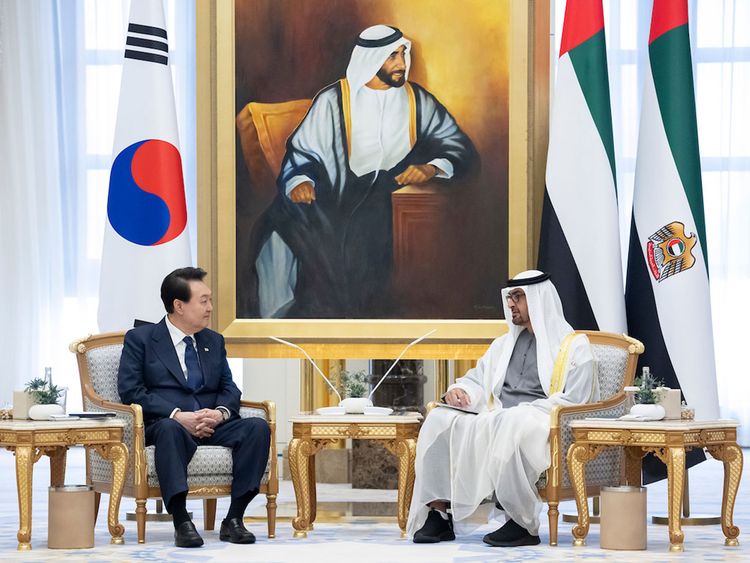 South Korea and the United Arab Emirates agreed to strengthen nuclear co-operation during a four-day state visit to the UAE by South Korean President Yoon Seok-yeol. Following talks with UAE President Mohammed bin Zayed Al-Nayhan, some 13 memorandums of understanding (MOUs) were signed in the fields of nuclear power, energy, investment, defence, and climate change.
South Korea and the United Arab Emirates agreed to strengthen nuclear co-operation during a four-day state visit to the UAE by South Korean President Yoon Seok-yeol. Following talks with UAE President Mohammed bin Zayed Al-Nayhan, some 13 memorandums of understanding (MOUs) were signed in the fields of nuclear power, energy, investment, defence, and climate change.
A joint statement said the two leaders had “agreed to deepen and further develop the Special Strategic Partnership between the two countries”. It added: "In particular, the two leaders agreed to strengthen strategic cooperation in four key areas: conventional energy and clean energy, peaceful nuclear energy, economy and investment, and defence and defence technology; as well as in other areas of mutual interest, including space, emerging industries and culture."
This was the 10th visit to the UAE by a Korean president but the first formal state visit since the establishment of diplomatic relations in 1980. During his visit President Yoon also toured the Barakah NPP and addressed Abu Dhabi Sustainability Week's opening ceremony.
At the Barakah NPP he accompanied the UAE President to a key ceremony marking an announcement by Emirates Nuclear Energy Corporation (Enec) that unit 3 of the plant had been completed. Construction of the $20bn Barakah NPP began in 2011 after South Korea won a tender for the project in 2009. Korea Electric Power Company (Kepco) led the consortium that is building the plant comprising four APR1400 reactors.
Construction of unit 1 began in July 2012, unit 2 in May 2013, unit 3 in September 2014 and unit 4 in September 2015. Overall construction is 97% complete. Units 1 and 2 are commercially operational, unit 3 is now in the commissioning phase, and unit 4 is 92% complete. Once all four units are operating, they will contribute up to 25% of the UAE's National Determined Contributions to Net Zero and be the largest source of dispatchable clean electricity.
The two leaders later toured the Barakah plant meeting both Emirati and Korean nuclear energy experts working there alongside other international specialists. President Yoon said: “Building on the success that we have achieved jointly as partners at Barakah and capitalising on Team Korea’s excellent nuclear technology and experience, now is the time for us to further our partnership to a greater height delivering additional cooperation in the UAE and making headway into third country nuclear markets together."
He added: "I hope that my visit marks a watershed for our comprehensive and strategic energy partnership that would extend beyond nuclear to areas including hydrogen, renewables and carbon capture and storage."
According to the joint statement, the MOU related to nuclear energy recognised “the importance of nuclear power plants as a critical source of energy security and an important element for the growth of the clean economy”. It added: “Given the existing deep level of cooperation achieved in this area, the two leaders expressed their determination to deepen and accelerate collaboration in the peaceful nuclear energy sector, both by successfully completing the Barakah Nuclear Energy Plant project and by jointly pursuing additional nuclear projects, whether in the UAE or third countries.”
The two leaders also “welcomed further cooperation in the field of peaceful nuclear energy through the UAE-ROK High-level Consultation on Nuclear Cooperation and agreed to seek ways to expand this cooperation into new areas, including evaluating the potential of small modular reactors (SMRs)”.
In addition, an MOU on Net-Zero Acceleration Strategic Cooperation was signed between Korea Hydro & Nuclear Power (KHNP) and the Enec. This envisaged formation of a consultative body covering various fields in the future and expanding practical cooperation in the field of developing export markets for NPPs in third countries and joint procurement of business finance. The two companies plan to cooperate closely in future technology development and R&D joint research, such as SMRs and micro-reactors.
KHNP CEO Hwang Joo-ho noted: "This MOU is very meaningful in that it has taken the first important step in achieving carbon neutrality and securing energy security through nuclear power and future technologies. We will actively cooperate to move toward a partnership of future net-zero technology cooperation in various fields such as hydrogen."
An administrative agreement was signed between Korea's Nuclear Safety and Security Commission (NSSC) and the UAE's Federal Authority for Nuclear Regulation (FANR). This "stipulates the obligations related to nuclear safety measures and export controls between the two countries, and has the effect of simplifying the nuclear export permit procedure between the two countries….With the conclusion of this administrative agreement, the NSSC and FANR can directly handle nuclear export permits."
The United Arab Emirates (UAE) also decided to invest $30bn in South Korea's industries, South Korea's presidential office said.
"We have decided a $30bn investment based on the trust in South Korea, which keeps promises under any circumstances," Yoon's office quoted the UAE president as saying. Yoon's press secretary, Kim Eun-hye, said in a statement the investment will be directed at nuclear power, defence, hydrogen and solar energy industries, among others.
Image: South Korean President Yoon Seok-yeol and UAE President Mohammed bin Zayed Al-Nayhan have agreed to strengthen nuclear co-operation between the two countries (courtesy of UAE Presidential Court)


